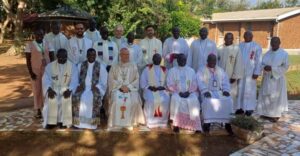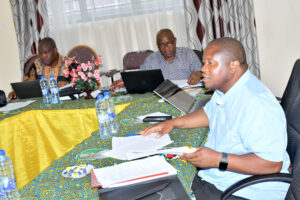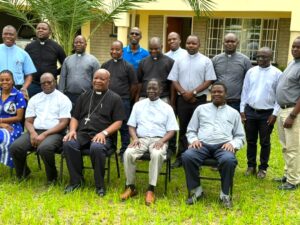TANZANIA: Calls for Solidarity, collaboration, commitment dominate ACWECA Plenary Assembly
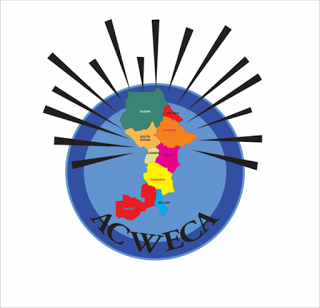
As the 17th Plenary Assembly of the Association of Consecrated Women in Eastern and Central Africa, (ACWECA) progresses, inputs from speakers and partners are shedding clearer light on the direction the Association is to take in the next three years.
One key input that encompassed all the three was the keynote address of H. E. João Cardinal Bráz de Aviz, Prefect of the Congregation for Consecrated Life and Societies of Apostolic Life, (CICLSAL).
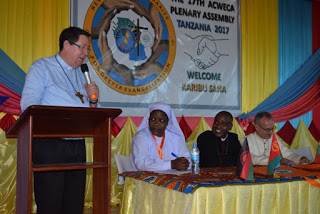
for Consecrated Life and Societies of Apostolic Life, (CICLSAL)
Delivering his key note address at ACWECA 17th Plenary Assembly
in Dar-es-Salaam Tanzania
“This Ecclesial Encounter is a great opportunity for us to grow together in our lives as people who want to follow Jesus to the end,” the Cardinal said Kurasini Centre in Dar es Salaam. The Cardinal earlier on led the opening mass at the Chapel of the Tanzania Episcopal Conference.
His address was based on the guidelines that arose from CICLSAL’s November 2014 Plenary Assembly in preparation for the Year of Consecrated Life in 2015 that took its mandate from Jesus’ Call “to put new wine into new wineskin.”
“After having taken a look at the challenges, we asked ourselves, how do we prepare new wineskins?” the Cardinal recalled. He said other emerging issues that arose were the need to seek fidelity in spirit, identifying formative models and attending to the formation of formators in light of multicultural processes in the service of authority.
And in the light of these emerging issues, the Cardinal called on the 17th ACWECA Plenary Assembly to heed Pope Francis’ call to continue with the renewal of consecrated life in the areas of spiritual, ecclesial, charismatic and institutional updating.
On the issue of collaboration with the Church hierarchy, he said Pope Francis had asked CICLSAL and the Congregation for Bishops to prepare the revision of the document ‘Mutae relationes’ (Mutual Relations). He further informed the Assembly that the Congregation for the Doctrine of Faith had published the document Iuvenescit Ecclesia (The Church Rejuvenates). This particular document he said presents a profound insight regarding the relationships between Bishops and consecrated people in light of the ecclesiology and spirituality of communion and in light of the two principles of the coexistence of the Church; hierarchy and charisms.
But while these avenues offer great opportunity for collaboration, he noted that it was not uncommon that every stabilised system tends to resist change and strives to maintain its positions. He said this sometimes hides inconsistencies, obscures the old and new or denies the reality and frictions in the name of fictitious concord or even disguising its own purposes with superficial adjustments.
Another challenge Cardinal de Aviz identified is the high number of departures from consecrated life both after formative stage and in advanced age in every geographical and cultural context. He said it was important to look for the causes of these departures.
“It is not just about affective crises but also of disappointment with a community life without authenticity,” the Cardinal warned, adding that at times the proposed values do not correspond to the actual experience or the number of activities is excessive in communities with predominantly old members.
“Although in many young people there is a willingness to transcend, a passion for the values of the Gospel, a highly standardised consecrated life blocks them,” said the Cardinal who is the Prefect of CICLSAL. The Brazilian Prelate further observed that integration among different cultures in some institutes has become a problem. Moreover, he said some Institutes have a few aging members on one hand and, on the other a large group of young people from different cultures who feel marginalised with only subordinate roles.
Under such circumstances, he said there was need for openness to formative choices, and he was quick to acknowledge the concrete efforts of Institutes and Conferences of Major Superiors (National and International) on this. “Formators must be sensitive to the values of the various cultures, to the new generation and to various life contexts,” the Prelate said.
Cardinal de Aviz also noted with concern the demands of work that often take precedence over systematic and organic formation, especially in Institutes of women. “There is often an imbalance between theological and professional training resulting in a lack of formation for discipleship and consecrated life,” he observed.
On the issue of formators, he said it was not uncommon to find only insufficient preparation but also an insufficient number of formators. “How does one provide a personal training – a personalised formation in which, in the initial stages the formator as an expert in the journey of seeking God daily walks alongside the disciple in trust and hope?” he asked. Thus, he called for the formation of the formators.
Cardinal de Aviz also underscored the important role of community life and this is what he had to say: “Through the fraternal life, each one learns to live with those whom God has put in his or her side, accepting their positive traits along with their differences and limitation. And in fraternity each one learns to share the gifts received for the building up of all. It is through the fraternal life that one learns essential missionary dimension of consecration.”
He also stressed the need for on-going formation, which he said still needs to become a true culture in which the clarification of theoretical concepts and the ability to review and verify the concrete experience in the community are joined together.
Another key issue that Cardinal de Aviz brought before the Assembly is the issue of authority. He said in many communities of consecrated life there is a tendency towards vertical centring in the excise of authority. He said some superior insist upon the personal character of their authority to the extend of eliminating the collaboration of their councils. This according to him is a weak or in effective co-responsibility in governance or the lack of appropriate delegation. And more so he said some superiors cling to power at times even to the point of changing the Constitutions, which in effect result into great evil to their charisms and neutralise the growth of other members who could offer greater help to the community.
And on the issue of the management of the ecclesiastical goods of the Institutes of Consecrated Life and the Society of Apostolic Life in the Church, the Prelate said this was one of the open challenges facing consecrate life today. He said it was Pope Francis who drew the attention of CICLSAL to the administration of ecclesiastical goods. CICLSAL in recent years has had two symposia on the subject in Rome. This was aimed at refining and updating the care of goods in possession of consecrated life throughout the world.
∼End∼
By Sr. Grace Candiru, MSMMC, ACWECA Communication Officer.
